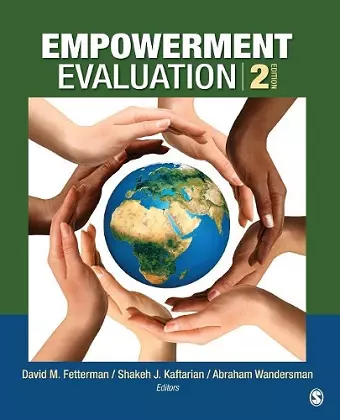Empowerment Evaluation
Knowledge and Tools for Self-Assessment, Evaluation Capacity Building, and Accountability
David Fetterman editor Abraham Wandersman editor Shakeh J Kaftarian editor
Format:Paperback
Publisher:SAGE Publications Inc
Published:4th Nov '14
Currently unavailable, and unfortunately no date known when it will be back

This Second Edition celebrates 21 years of the practice of empowerment evaluation, a term first coined by David Fetterman during his presidential address for the American Evaluation Association. Since that time, this approach has altered the landscape of evaluation and has spread to a wide range of settings in more than 16 countries. In this new book, an outstanding group of evaluators from academia, government, nonprofits, and foundations assess how empowerment evaluation has been used in practice since the publication of the landmark 1996 edition. The book includes 10 empowerment evaluation principles, a number of models and tools to help put empowerment evaluation into practice, reflections on the history and future of the approach, and illustrative case studies from a number of different projects in a variety of diverse settings. The Second Edition offers readers the most current insights into the practice of this stakeholder-involvement approach to evaluation.
"The book provides depth and detail about the nature, variety, rigors, and credibility of self-evaluation, no small contribution…there is much of value here, strong evidence of an approach that, well-facilitated and comprehensively engaged, can make a substantial difference." -- Michael Quinn Patton
"This text brings empowerment evaluation to life, and in doing so it offers all evaluators a large body of relevant concepts and tools for designing, implementing, and assessing evaluation efforts that engage, democratize, and strengthen stakeholder’s self-determination."
-- Gary J. Skolits, University of Tennessee"This twenty year follow-up to the original, provides even better and richer stories about the versatility and utility of empowerment work in most social contexts. It expands our understanding of how empowerment evaluation is foundational to any effort to improve and measure growth in any community/social environment."
-- Robert Shumer, University of Minnesota"One of the greatest evaluation innovations of the past two decades has been the development of a professional and systematic approach to self-evaluation called empowerment evaluation. This book offers you the latest cutting edge understanding of this powerful innovation and evaluation approach. May you be inspired and empowered as you adventure through the chapters in this outstanding volume!"
-- Stewart I. Donaldson, Claremont Graduate University, writing in the Foreword"Empowerment evaluation is the name given by David Fetterman in his American Evaluation Association (AEA) 1993 Presidential Address to an evaluation theory and practice intended ′... to foster improvement and self-determination′...Empowerment evaluation [is] of the people, for the people, and very much by the people. Our role as evaluators [is] to be a critical friend, a coach, and a source of technical assistance when it [is] requested by the self-evaluating communities and organizations. No wonder that in 1993 ′conversations and arguments spilled out into the hallways′...Empowerment evaluation and its leaders have received AEA’s highest accolades, such as the Myrdal Evaluation Practice Award (awarded to Fetterman in 1995 and Kaftarian in 1996), the Outstanding Publication Award (Wandersman in 2008), and the Lazarsfeld Evaluation Theory Award (Fetterman in 2000) as well as other recognition...Each chapter giving a case instance explicitly connects the 10 principles of empowerment evaluation to the processes, decision-making, participation, utilization, and other aspects of the evaluations reported...the results of more than 25 years of dedicated hard work and diligent thought are being shared with us. My recommendation remains, unequivocally and appreciatively: This book belongs on our shelves. Get it, read it, and, as appropriate, use it." -- Lois-ellin Datta, Datta Analysis, Kailua Kona, HI, USA
ISBN: 9781452299532
Dimensions: unknown
Weight: 650g
392 pages
2nd Revised edition